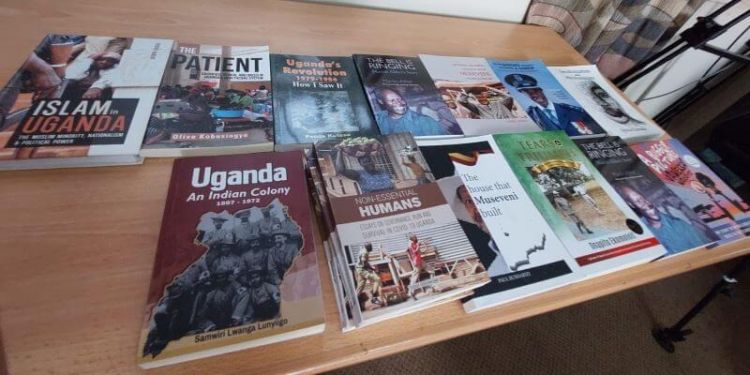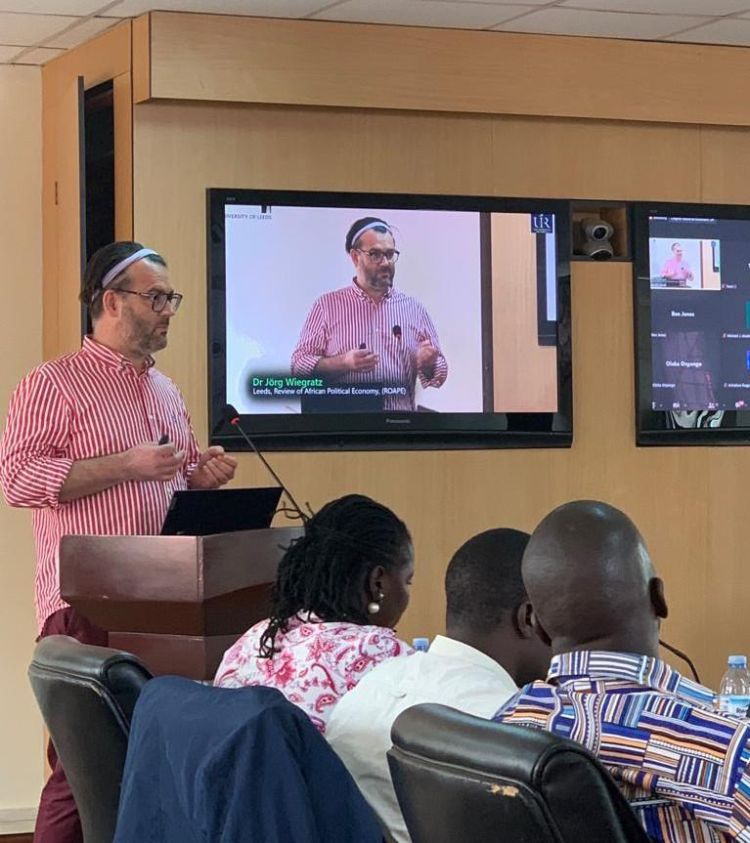Dr Jörg Wiegratz co-convenes Uganda's Neoliberalism at 40 conference

The conference took place on 18-19 January 2024 at Makerere University, Kampala.
It was organised by Drs Sarah Ssali and Rose Nakayi (Makerere University), Dr Giuliano Martiniello (Université Internationale de Rabat), Professor Godfrey Asiimwe (Makerere, Mountains of the Moon University) and Dr Jörg Wiegratz (POLIS, University of Leeds), and brought together scholars and activists from around the world to discuss 40 years of neoliberalism in Uganda.
Dr Wiegratz delivered his paper, “‘Accountability Patriotism’ in a market society: Fighting fraud and corruption through citizen engagement’ on a panel focussing on socio-cultural change.

Dr Jörg Wiegratz presenting at the conference.
The conference’s success and impact has been discussed in reflective pieces published on the Makerere University website, in the Ugandan newspaper The Observer and on the news site Campus Bee.
The conference organisers have provided a piece about the conference which is available to read below:
Debating the 40 years of neoliberalism of Uganda at Makerere University
Four decades into the neoliberal transformation of Uganda, the all-encompassing and transformative character of this process is evident. Scholars have grappled with the analysis of some of these changes; mostly focusing however on issues of governance, policy-making, military conflict, and state-building. Yet, relatively little analytical attention has been given to major topics concerning the making and operation of today’s neoliberal Uganda, this exemplary market society in East Africa and the continent at large: this includes the political economy of neoliberal restructuring (including the roll-out of commercialisation across sectors and the rise to dominance of foreign transnational corporations (TNCs), the political sociology of the formation of hegemonic and counter-hegemonic movements, and the political ecology of extractivism. There exist therefore significant gaps in the academic literature about the interlinkages between economic, political, sociological, ecological, and cultural processes in this highly consequential round of capitalist restructuring of the country: the phase that has locked-in a distinct capitalist institutional architecture for the foreseeable future. Importantly, the question of how to contest, resist and change the existing neoliberal polity, economy and culture – ie the fundamentals of Uganda’s capitalism – is also not often analysed in much of the scholarship. And yet, the ‘what to do?’ question is prominent in the public debate in the country, given the manifold crises – across economic and social sectors – brought about by neoliberalisation.
The ’what to do’ question was thus also one of the central points of debate at the recently concluded conference held at Makerere University in mid-January 2024 on ‘Uganda’s Neoliberalism at 40: Taking stock of the operation of an exemplary market society in East Africa’.
The conference took place in a wider context in which universities have been recognized as agents of change in many societal spheres. They are moving away from the ‘ivory tower’ concept, where they are seen as occupying special places in terms of knowledge generation without much concrete connection to society and its everyday challenges. Instead, the change-oriented agency of today’s university is evident also in the offering of a platform to debate and generate ideas that can inform policy for change, and involvement in change-oriented projects with other stakeholders, public and private. The conference thus aimed at providing such a platform for analysing and debating various developments of Uganda’s neoliberalism since the early 1980s. The conference organisers had previously collaborated as part of the work on the edited collection Uganda: The Dynamics of Neoliberal Transformation which was published in 2018.
The conference gave particular focus to relevant developments in matters of political economy, politics, society and culture in Uganda’s market society since 2018. It brought together 42 speakers from Uganda and 12 other countries from around the world, across disciplines including civil society leaders, journalists, intellectuals, grassroots activists, citizen researchers, as well as scholars and PhD students. There were up to 40 people following the discussions online, joining the collective virtually via zoom technology, up into the evening time, on both conference days. This large gathering thus allowed for broad discussions and cross fertilisation of ideas on the various themes, connecting theory and practice within the Ugandan context.
The keynote was given by Professor Yash Tandon, a major figure in political and intellectual life in Uganda and beyond. Tandon is a Ugandan public intellectual, policymaker, civil society activist, founder of Southern and Eastern Africa Trade Information and Negotiations Institute (SEATINI), and author of Common People's Uganda and Trade is War: The West’s War Against the World. Tandon positioned the conference in the historical context of Uganda and highlighted the imperialist roots of the neoliberal policies that are driving the restructuring agenda in Uganda today. The keynote panel brought together interventions by Professor John Jean Barya (Makerere), Dr Martiniello and the public intellectual, writer and activist Kalundi Serumaga.
Papers were presented under panels on various themes such as labour, agricultural and environmental change, oil and energy transition, socio-cultural change, education, social policy state, elections and political agency. Several papers interrogated the pertinent neoliberal policies as drivers of problematic changes in various sectors such as oil and gas, education, health and housing, and in matters such as labour and labour unions. This stimulated debates on a key question: whether indeed there could be alternatives to the ongoing neoliberalisation of Uganda that seems to be unstoppable, across all realms of society. Commentators on the papers included Dr Yusuf Serunkuma (Martin Luther University Halle-Wittenberg) and journalist and activist Agatha Atuhaire. They reflected on the everyday life aspects and the deep politics of neoliberalism in Uganda and highlighted various forms of existing resistance and push back vis-à-vis neoliberal political economy. Winnie Byanyima (UNAIDS Executive Director) enriched the conference with her comments about global and local neoliberalism, and the importance of activism in the struggle for change in today’s Uganda: she raised the ‘what should we do?’ question on conference day one; which was picked up by subsequent speakers including in the conference’s closing speeches and discussions.
It is hoped that many papers presented at the conference will be developed further, subjected to peer review, and published to inform research and policy making in Uganda and beyond. The conference participants continue their networking and collaborations beyond the end of the conference. The next conference on contemporary capitalism in Uganda is expected to be held in 2026. The conference was supported by the POLIS Strategic Investment Fund (SRIF) 2023/24 (University of Leeds). This grant also helped citizen researchers from northern Uganda to participate in the conference and present their research findings.





